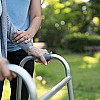Relief for caregiver burnout

Adapted from Boosting Your Energy , Medical Editor: Anthony L. Komaroff, MD, Simcox-Clifford-Higby Professor of Medicine, Harvard Medical School; Senior Physician, Brigham & Women’s Hospital, Boston.
A caregiver is someone who handles many or all of the needs for a loved one or friend who is no longer able to care for himself or herself because of illness, age, or disability. Caregivers support their loved ones in many settings: at home, at the hospital, during visits to nursing facilities, and sometimes even from afar.
Avoiding caregiver burnout: you don’t have to go it alone
While caregiving can be wonderfully rewarding, it can also take a toll physically, emotionally, and financially. Even if you are the primary caregiver, you don’t have to do everything alone. Caregiver support can come in many forms. And remember that the better you care for yourself, the better you can care for your loved one.
The self-care tips below are designed to help you alleviate caregiver burnout and take care of yourself so you can regain your vitality.
Ask for help
Tell friends and family the job is too much for you alone. Ask them to help brainstorm solutions. Always accept help when it’s offered. Some people will make specific offers of help. You can encourage others to choose from a list you create of what’s needed, or assign jobs you’ve matched to their capabilities.
Tap into religious communities
A religious or spiritual community can be a strong source of assistance if you or the person you are caring for belongs to one.
Try a caregiver support group
Many organizations, hospitals, health care plans, and religious groups offer caregiver support groups for caregivers. Support groups are a good place to blow off steam and share ideas with people who are facing similar situations.
Lean on friends
Friends can offer you a recharge when you’re experiencing caregiver fatigue. And friends who listen — and offer advice only when you ask directly — are invaluable. Try to be around people who aren’t judgmental. Ask outright if you can use them as a sounding board whenever the need arises.
Bundle errands
Make a weekly master list of everything that needs to be done, including appointments, shopping, drugstore runs, trips to the gas station, and other errands. Dole out simple tasks, if possible, or do as much as you can in one time slot.
Clear your schedule
Set aside time to spend with a partner or family. Start small. Perhaps set aside one evening a week or a breakfast out together if you’re caring for someone in your home. Then, add to it when you can. Let voicemail handle calls during certain hours so you can have uninterrupted time.
Look for shortcuts
Could you batch your cooking on certain days to save time? If a clean house is important to you, can you make your room an oasis of clean and calm while being less strict about other areas? Can you let some jobs slide or hire help to get them done?
Refuse to do it all
Opt for grocery delivery or cleaning services that can give you more time for yourself. Consider outside respite services, such as adult day care, once or twice a week. Consider if it’s possible that other family members can help pay for these services.
Quell your guilt
Caregiving attracts guilt like a magnet pulls iron filings. There’s always something else you could be doing or should have done. But odds are good that you do a great deal. Pat yourself on the back for all you give; don’t criticize yourself for failing to give more.
Eat and drink well
Include plenty of vegetables and fruits in your diet, and choose whole grains over refined-grain products. Limit or cut out unhealthy fats and excess sweets. Keep healthy snacks available, like air-popped popcorn or fruit. Don’t forget to stay hydrated by drinking four to six cups of water a day.
Stay active
Frequent exercise delivers proven health benefits such as lowering cholesterol and blood pressure. Try to get 30 to 60 minutes of moderate exercise a day, most days of the week.
Be kind to yourself
Listen to music you like, enjoy a luxurious bath, take a yoga class, do an activity you enjoy, or go out to dinner. Regular time off can renew your spirit and energy and remind you that you’re neither invincible nor completely irreplaceable.
Stay connected
Catch up with friends by phone or email. Establish a weekly walk with a friend or an occasional lunch or movie.
Ease caregiver stress
Take time to alleviate caregiver stress. Learn meditation or other relaxation techniques that can help relieve caregiver burnout.
Disclaimer:
As a service to our readers, Harvard Health Publishing provides access to our library of archived content. Please note the date of last review or update on all articles.
No content on this site, regardless of date, should ever be used as a substitute for direct medical advice from your doctor or other qualified clinician.















